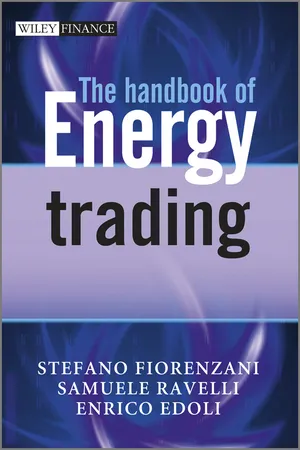
- English
- ePUB (mobile friendly)
- Available on iOS & Android
The Handbook of Energy Trading
About this book
To thrive in today's booming energy trading market you need cutting-edge knowledge of the latest energy trading strategies, backed up by rigorous testing and practical application
Unique in its practical approach, The Handbook of Energy Trading is your definitive guide. It provides a valuable insight into the latest strategies for trading energy—all tried and tested in maintaining a competitive advantage—illustrated with up-to-the-minute case studies from the energy sector.
The handbook takes you through the key aspects of energy trading, from operational strategies and mathematical methods to practical techniques, with advice on structuring your energy trading business to optimise success in the energy market.
- A unique integrated market approach by authors who combine academic theory with vast professional and practical experience
- Guidance on the types of energy trading strategies and instruments and how they should be used
Soaring prices and increasingly complex global markets have created an explosion in the need for robust technical knowledge in the field of energy trading, derivatives, and risk management. The Handbook of Energy Trading is essential reading for all energy trading professionals, energy traders, and risk managers, and in fact anyone who has ever asked: 'what is energy trading?'
Frequently asked questions
- Essential is ideal for learners and professionals who enjoy exploring a wide range of subjects. Access the Essential Library with 800,000+ trusted titles and best-sellers across business, personal growth, and the humanities. Includes unlimited reading time and Standard Read Aloud voice.
- Complete: Perfect for advanced learners and researchers needing full, unrestricted access. Unlock 1.4M+ books across hundreds of subjects, including academic and specialized titles. The Complete Plan also includes advanced features like Premium Read Aloud and Research Assistant.
Please note we cannot support devices running on iOS 13 and Android 7 or earlier. Learn more about using the app.
Information
Table of contents
- Cover
- Series Page
- Title Page
- Copyright
- Dedication
- List of Figures
- List of Tables
- Preface
- Acknowledgements
- Chapter 1: Energy Markets as Efficient Markets
- Chapter 2: Directional Trading
- Chapter 3: Spread Trading
- Chapter 4: Options and Non-Linear Derivatives
- Chapter 5: Structured Products on Energy
- Chapter 6: Metatrading Strategies and Capital Allocation Techniques
- Bibliography
- Index